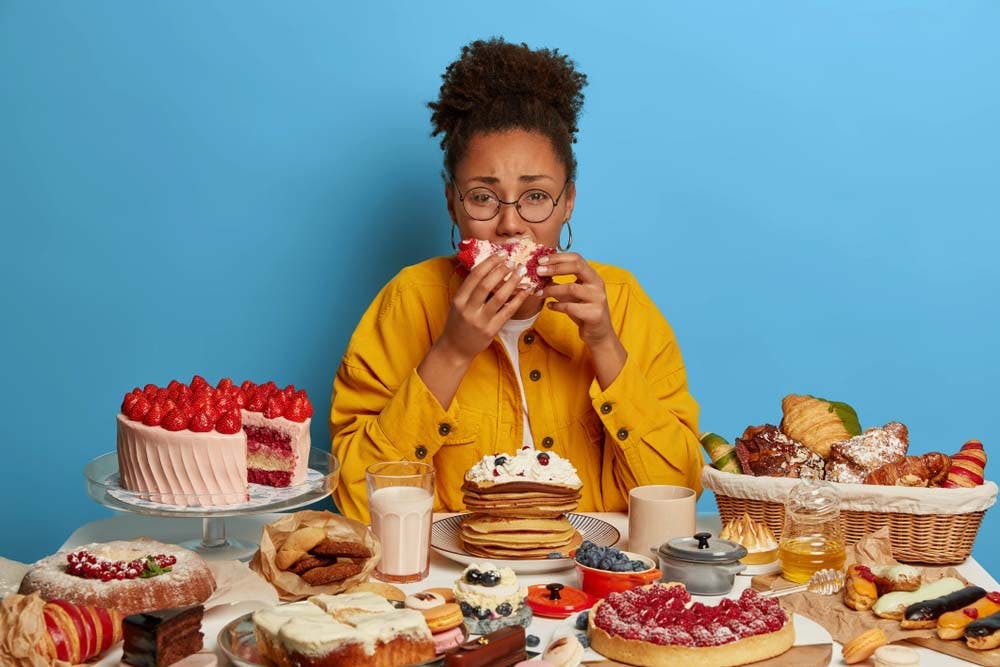Nov 25, 2021
6 Signs You are Overeating

We all find ourselves overindulging in our favorite foods from time to time, especially during the holidays. However, overeating every day can lead to some pretty significant health concerns.
While there's no one-size-fits-all answer since nutrition needs vary based on several factors (i.e., size, gender, age, metabolism), it's necessary to recognize the signs that you're overeating.
Think you might be taking in too many calories? We put together this list of six indicators and ways to get back on track.
If you or someone you know is struggling with an eating disorder, please seek medical help. The National Eating Disorders Hotline provides support, resources, and treatment options for yourself or a loved one.
What is overeating?
Overeating refers to when we consume more calories than needed and that our bodies can use to make energy. It's also a defining characteristic of binge eating disorder.
Causes/risk factors for overeating:
Some risk factors that can contribute to overeating include:
Undergoing a traumatic life event
Being the victim of abuse/neglect
Low self-esteem
Personal/family history of mental illness
Family history of eating disorders
Complications of overeating
There are many behavioral, physical, cognitive, and psychosocial complications that overeating can contribute to, such as:
Social isolation/withdrawal for activities
Participating in unsuccessful dieting attempts
High cholesterol
Sleep apnea
Fluctuations in weight
Fatigue
Fixation with food and body weight
Decrease or loss of sex drive
Frequent changes in mood
Depression/Anxiety
Signs you are overeating
You eat alone to avoid feeling guilt or shame
Some studies show that eating alone can cause us to overeat AND choose foods that are unhealthy. With that being said, if you live by yourself or work from home, you probably consume most meals by yourself. However, if you find yourself constantly avoiding meals with other people, it could be a sign you feel guilty about your eating behaviors.
While changing this mindset won't happen overnight, there are steps to take to help you overcome these feelings of shame and feel comfortable eating with others.
Consult with a registered dietician to help you learn how to make healthy food choices.
Plan your meals - If you are eating out at a restaurant, look at the menu beforehand to reduce anxiety and help you choose nutritious menu items.
Keep a journal to help keep track of positive or negative habits as well as how you feel after eating.
Talk to a therapist or counselor.
You eat for other reasons than being hungry
Emotional eating refers to finding comfort in food. From work-related stress and financial issues to relationship troubles or a traumatic event, people use food to suppress negative feelings.
While indulging in a quart of your favorite ice cream to soothe heartbreak from a breakup isn't necessarily a bad thing, it's important to be mindful. Overeating may occur when food becomes a continuous emotional crutch.
Instead, try to face issues as they arise. If you find yourself overeating to deal with past or present trauma/emotions, consult with a therapist to help you learn healthy coping skills.
You eat while distracted
With technology always at our fingertips, it can be easy to snack excessively while scrolling through social media or binging our favorite show. However, continuously being distracted while eating can lead to disconnection from feeling full, thus overeating.
Mindless eating means our focus is on something else, and we are no longer paying attention to how much we're putting into our body and how much it needs. Make it a point to put down your phone or tablet and cut the TV off when it comes time to eat. Putting all your focus on your food allows you to enjoy your meal more as well as eat enough for your body's needs.
You feel blah/weighed down after most meals
Know that post-holiday-meal feeling? If you feel that way after most meals year-round, you need to take a closer look at your portion sizes.
You shouldn't feel weighed down, bloated, or have the need to lay down after a meal. This could be a sign that you have too many heavy food options on your plate or are eating too much in one sitting.
You finish your meals faster than normal
In general, it takes our brains about 20 minutes to signal that we are full to our stomachs. When you eat too quickly, you run the risk of overeating during the 20-minute message delay.
If you find yourself flying through your meal, there are a few things to try to help you slow down:
Take a break between each bite
Drink some water between each bite
Focus your mind on how the food tastes and smells to help you become more mindful of your eating pace.
You feel the need to nap right after eating
Ever heard someone say a meal put them into a "food coma"? While it may sound like just an expression, fatigue can be a symptom of eating too-large servings.
Eating causes the body to release more significant amounts of insulin and causes blood sugar to rise. As a result, energy levels in the body decrease, causing sleepiness.
Rather than eating big meals, eat smaller portions and snacks every few hours to maintain energy levels. Fruit or a handful of nuts can help curb an energy dip.
Final thoughts
Overeating can have many adverse effects on your mental, emotional, and physical health. If you are experiencing any of the above signs, it's vital to speak with your physician to find ways to help incorporate food in a healthy way into your life.
There are also many resources available to help with compulsive overeating:
At CareCard, we are passionate about helping make your prescription payments more affordable, saving members up to 85% on prescription drugs and medications. Learn more about how CareCard's pharmacy discount card can help make your medication payments more manageable.